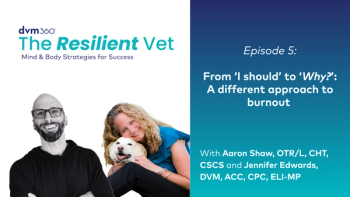
Combatting suicide
Despite high military suicide rates, veterinarians are still more likely to be victims of suicide. Why?
Dr. Dean ScottA widely read study concluded veterinary professionals are four times as likely to die by suicide than the general population. Another study about suicide in the military cites that military members are twice as likely to do so than the general population.
Really? We are even more likely than military members to commit suicide? I was in the Army Veterinary Corps for five years. When I think of the list of potentially most-stressful occupations, being in the military is on it.
If I compare my day-to-day veterinary job with that of a soldier at a forward operating base in Afghanistan, away from his family, in hostile territory, there is no doubt that the soldier is, hands-down, operating under more stress than me. So, why the disparity in suicide rates? I think the answer lies in the mental attitude prior to entering either field.
When people enter the military, there is an understanding of what they may be getting themselves into, no matter how sublimated. The training that soldiers undergo lays the groundwork for the discipline, mental and emotional buttressing needed to complete their jobs and their missions. There is also a support system in place where soldiers help each other or can seek help for mental health issues, though many feel more could be done.
When people enter the veterinary field, we are flat-out not prepared for the mental stress that the job entails. We approach the field in a very emotional way. When I was a teenager, some veterinarians gave soft warnings about the job, but what I have encountered was so much more than they hinted at.
Veterinary academia does a poor job of preparing us to deal with the public as the devouring beast that it is. We enter the field unprepared for the amount of passive neglect we see, the people who don't give even minimal care to sometimes very serious problems, the amount of animosity toward us, the bullying we are subjected to (both personally and anonymously), and the amount of negotiating we do just to provide an animal with some kind of relief.
So, the difference, I believe, in the comparative suicide rates has to do with expectations and preparedness. We in the veterinary community are often caught flat-footed when our years of training and our earnest, honest approach in trying to give care to animals is met with disdain, resistance or an uncaring eye.
We are given no tools or insight as to how to mitigate our stress and how that stress is compounded by the number of hours many of us work. There are resources available, but the time committment needed to get help is, in itself, stressful. I'm not sure how much vet schools have changed in 22 years, but I doubt many places are dealing with this subject in-depth.
Yet, we need to. We have to do a better job of not necessarily “deterring” people from the field, but giving them more realistic expectations. We need to get our members to understand that they are human and, therefore, imperfect. We need to apply the motto “first, do no harm” to ourselves.
A graduate of UC Davis School of Veterinary Medicine, Dr. Dean Scott has enjoyed 35 years in the veterinary profession, including five years with the U.S. Army Veterinary Corps. He now practices small animal medicine at Animal Clinic of Brandon in Brandon, Florida.
Newsletter
From exam room tips to practice management insights, get trusted veterinary news delivered straight to your inbox—subscribe to dvm360.





